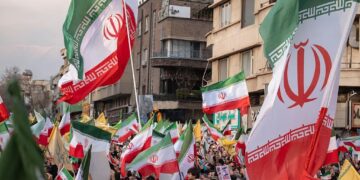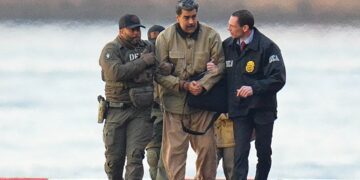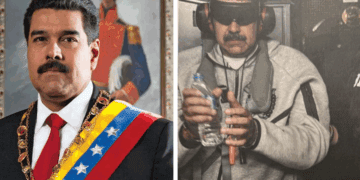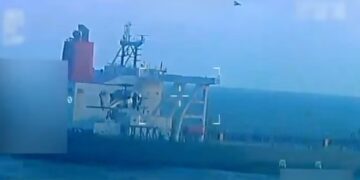By John F. Di Leo -
A traveler with a camera filmed a scene at Chicago’s Midway Airport: a three-hour-plus TSA security line that snaked across the terminal, out the door, and around the building… and uploaded it to YouTube.
The fury of the day, in an age beset with furies, is therefore an anger directed against the TSA for our often unforgivably-long airport security lines. The DHS secretary even took to the podium to answer complaints, and to assure us that his system is not in fact "a national crisis."
Sure, in this case, there was an alleged excuse – Chicago had seen hundreds of flight delays in recent days. But that’s not really much of an excuse when you consider the fact that Chicago’s O’Hare and Midway airports together make up one of the busiest air travel hubs on earth, and such bundles of flight delays and cancellations are not unusual for them. They should plan for such bottlenecks, travelers declare, not only for the smooth days.
And that is true. But even when it’s not a day like this, something is dreadfully wrong with air travel in America. And oh yes, the Secretary of Homeland Security is wrong about his department's effect on the nation.
The Security Experience
At every USA airport, we require every traveler to open his luggage and remove his toiletries bag (which must be a clear 1 quart plastic bag, of course) for inspection. He must open his laptop case and put his laptop, tablet, and phone in a separate bin. At many airports, he must remove his shoes and belt, his keys and wallet, all to be put in the bins for viewing.
At every USA airport, we spent tax dollars hiring staff for the TSA. They check our boarding passes and our driver’s licenses, watch us and wand us, sometimes perform a very personal pat down, sometimes use chemicals to check our shoes for other chemicals.
At every USA airport, we set aside huge areas for the security line – areas that might otherwise be open space for comfort, or seating and laptop tables for work, or concessions for commerce.
At every USA airport, we spend millions on conveyor belt systems, x-ray and other viewing systems, and all sorts of high-tech machinery for studying our property and our bodies.
The government nationalized airport security after the attacks of September 11, 2001, and life has never been the same.
We have adjusted to it… we have learned to add two hours or more to every flight day, even though it hardly ever takes that long. We may know that the security line is usually a half hour, but since we can never risk being late for a flight, we allow two hours on the outside, just in case. (Personal note: in my own experience, the lines at the terminals I use average between 30 and 45 minutes, but it has taken the full two hours that I allowed several times at Chicago, LAX, and Boston… so I always allow two hours, just in case).
So we have built this added time into our lives. For the times when security takes less time, we bring books with us and read during the workday (something that ought to be done in the evening). Or we watch CNN or Fox on the airport screens to kill the time (something that we would probably be better off without, entirely). Or we just sit and watch the people go by, not even trying to pretend to ourselves that this extra time in the airport is anything but a total waste.
But we are used to it… as long as it doesn’t go even longer than expected – like the three hour lines at Midway that created the current uproar.
Conditionally Altered Expectations
We have grown so used to it, in fact, that we now cheer when it’s much shorter than expected. If we budgeted two hours, and it’s just 30 and 45 minutes, we rejoice as if we had accomplished something.
We now choose our flights based on when the security lines will be shortest… instead of balancing price and our own convenience, we must now add in this odd factor, that at some times of day, all other things being equal, we’ll be more likely to waste another hour and a half in this line. So it affects the timing of our business trips and our personal trips; it affects the productivity or enjoyment of the trip itself.
Twenty years ago, you arrived, printed or picked up your ticket, checked your bags (if you weren’t carrying them on), then boarded the flight. Today, you must allow for these added hours (varying wildly, depending on the airport, the time of day), this newly added period of irritating nothingness.
If you arrive early, just to be safe, you could shop, or read, or do work on your laptop, or even make sales calls on your phone… but not while in that line. No commerce can be conducted in the security line; the time spent there is rendered empty, wasted, meaningless.
And we accept it. The fear of terrorism has made us accept two things that we never accepted before 2001: that everyone should be treated as a suspect (in a nation built on the theory that “you’re innocent until proven guilty”), and that if security provisions are needed, then of course the government should perform them.
These are both jarring changes to the American character.
Everyone a Suspect
The United States were born in a reaction to tyranny; a distant king had put one of our cities under martial law, ruling Boston as if a militarily occupied territory… not briefly, but for eight long years, from 1768 through 1776, when General Washington and the Guns of Ticonderoga finally drove the British occupiers out.
As a result, this nation always thought of that experience when writing our laws. We affixed a Bill of Rights to our state constitutions, and eventually, to our federal Constitution as well, forbidding the government from search and seizure without probable cause.
Where is the Constitutional authorization for the government to go through our belongings without a search warrant, to detain us without justification, to pat down our person to the point that anyone not in a TSA uniform would be arrested for it, on charges of molestation?
There is no justification, but there is fear. Fear of another terrorist attack, and that fear has made us forget our rights. It has made us forget the bonds we once placed upon our government to keep it from abusing us.
And there is no justification, but there is precedent. Long before September 11, we allowed the big cities to ban law abiding people from wearing their own sidearms, no matter how dangerous the neighborhood. Long before September 11, we placed metal detectors inside the doorways of government buildings and entertainment venues and museums… we got people used to the idea that someone else – whether the real police or private security guards – has the right to inspect us before allowing us in.
The regime that followed the attacks of September 11 wasn’t new. The new rules were just a continuation of the old ones. The frog had been in the pot a long time.
The Problem-Solver of Last Resort
Before September 11, most security was managed by the private sector, or at least by the locality. The airport hired its own security personnel, or the airlines did, or they used local or county or state police through some arrangement of their own.
But in the aftermath of September 11, the federal government nationalized this responsibility, developing a whole new federal bureaucracy out of whole cloth. Before you knew it, there were TSA uniforms in every airport, standardized security procedures, and taxpayer-funded personnel to ensure that it’s done right.
Again, security wasn’t new… but having the federal government running it was. The change was subtle, but once it was nationalized, it was over. The federal government now had a huge number of new federal jobs, new federal patronage, new federal spending.
Such a nationalization could not have been done overnight… not unless there were already an apparatus in place, and a failure that could be blamed on the old way. The “ancien regime” has failed, we need a new regime to replace it. Enter the federal government.
The libertarian movement is fond of telling the tale of the frog in the pot… a tale best popularized by the great Dr. Walter Williams: You can’t boil a live frog by tossing him in a pot of boiling water; he’ll jump out as soon as he recognizes the danger. But if you toss him in a pot of cool water, he may think it’s safe, and not notice the danger as you turn up the heat. By the time he realizes he’s being boiled, it’s too late.
So it is in the United States. Despite a Constitution that would never have allowed the government to nationalize security at airports, a century of government expansion, along with a century of disregard for the Bill of Rights, have landed us in a place where Washington D.C. can do whatever it likes, with minimal expectation of Constitutionally-based opposition. We never saw it coming, and after September 11, we were boiled.
Security Throughout History
Was the terrorism of September 11 truly new enough to justify this change? It was certainly presented as such. “Now that an enemy can take over a plane and use it as a weapon to attack our cities, the old rules no longer apply.” This we were told, with sincerity, by people we thought were on our side.
But was it really new?
The dangers of terrorism, sabotage and hijacking have existed for as long as there has been international commerce.
Back in the 18th century, one favored method of warfare between the French and English was naval capture of each other’s ships, painting them and changing their names and flags, and using them in battle against their prior owners.
Piracy has existed forever; the Barbary pirates of the 1700s and 1800s followed a tradition of pirates in the Indian Ocean and Mediterranean Sea dating back a thousand years before the time of Christ. Of COURSE planes will be hijacked sometimes; ships were hijacked 3000 years ago for similar reasons and in similar ways.
Even the claim that a transport vehicle’s use to attack a town (rather than another vessel) was new, is false. When Stephen Decatur and his brave crew boarded the Philadelphia and set it aflame during the Barbary Wars, the burning wreck’s munitions stores went off uncontrollably, firing cannonballs into the towers of Tripoli’s fortress, outside of which the ship had been moored, destroying buildings and killing people just the same. Such things happen in war.
The claim that such things are new in the War on Terror is simply false. Yes, the scale is different, some of the tools are different, and some of the motivations are different… but just as the United States’ first war was a defensive war against the muslim nations of North Africa, so too is the present one. The conditions haven’t changed that much.
What HAS changed, however, is the response. In those days, our government concentrated on warning our own people, and taking action against our enemy. Today, our government is less likely to act against the enemy, and is much more comfortable taking the same measures against our own citizens, treating every passenger as a potential enemy soldier. Every American should be worried indeed, not just at the cost and the irritation of the present system, but at the massive government expansion that enables it. Even when 18th century Brits were rooming their soldiers in Bostonians’ own private homes, they would never have gone so far as the US government has today against our own citizens.
The Practical Result
We know from published reports and anecdotal stories what this past decade and a half of government security has accomplished.
They have taken thousands of handguns, pocketknives, pairs of scissors, and fingernail clippers from passengers (with no idea of whether the people meant to use them for good or ill)… and they have also MISSED thousands of handguns, pocketknives, pairs of scissors and fingernail clippers.
There have been thousands of islamofascist terrorist attacks since… from highway snipers to taxicab sidewalk jumpers, from backpack bombers at a Boston Marathon to Christmas party mass shootings in California, from shooting up a recruiting office in Chattanooga, TN to beheading coworkers in Moore, OK.
Has the airport security takeover prevented any more hijackings? Maybe, maybe not.
But perhaps our government’s massive concentration on this one kind of attack has been a part of the reason they’ve missed all the others. With such a massive budget and effort put into preventing another 9-11, we have nothing left (in funds, in personnel, perhaps even in motivation) to work to prevent the next San Bernardino, the next Chattanooga, the next Moore.
What we do know, however, is how much time is wasted at airports, checking to see if a little old lady has a bomb in her purse, or if a child has a real gun inside her stuffed animal. And if we do just a bit of math, we can estimate how much this wasted time costs our economy.
Air travel is split between three main categories: business travel, vacation travel, and college student travel.
It’s difficult to put a value on the travel time of people on vacation, or students going to school, but obviously there IS value there, a value that’s taken from them when we force them to waste their time in a thirty, sixty, ninety, or even more minute line. Perhaps they might otherwise have been able to work productively longer before they left, or spent productive time with family or friends, or gone out to lunch or shop beforehand, but couldn’t because they had to allow time to stand in line at the airport.
We won’t even try here to estimate that value, other than to ask, Gentle Reader, what might you do, if you had another hour or so of free time? Might it be productively spent? Might you enjoy it? Might your family or friends appreciate the extra attention?
But it is possible to at least estimate the value of the traveltime of people “on the clock,” as it were… the people who travel for business.
The people who travel for business have a massive variety of salaries, so it’s impossible to accurately estimate an hourly wage for them. This group consists of CEOs and midlevel managers, salesmen and auditors, engineers traveling for a project, marketers traveling for a conference, trainers and buyers, inventors and writers, scientists and entrepreneurs. The list is endless. We cannot average their salaries, but we know they are not the minimum wage set; for the most part (with some exceptions of course), companies pay to send their more highly-compensated personnel to conventions, or to their other factories, or to call on clients, or attend or lead training.
Some of these employees earn $50,000/year, some $150,000, some $500,000, some in the millions.
And all are standing in line, unproductively, for 30, or 60, or 90, or 120 minutes, every time they travel by plane.
Just to lowball the number – so we cannot be accused of exaggeration – let’s say these folks are paid at least $25/hour (obviously the true average is much higher, but this lowball will account for the folks traveling on vacation, and the students going to and from college).
There are over 14 million commercial flights per year in the USA, and the average seating is well over fifty per flight. If we just estimate one wasted hour per flight, for all these people, with our lowballed average value of $25/hour, we see that our security lines are costing our economy well over $17.5 billion per year in forced unproductive time. (Again, these estimates are all lowballed in various ways, so the true number is much higher).
That’s what this system is costing us.
Our government does this, in a thousand other ways too, every day. Federal bureaucrats sending out mandatory surveys… federal agents studying shipping patterns or promotion averages or workplace greening efforts or commodity price fluctuations… Even when these things are well intentioned – and many certainly are! – the cost they inflict on our economy, by forcing otherwise productive people to be unproductive, is immense.
Wonder why we have 95 million people of working age, currently “outside the workforce”?
Wonder why actual net job creation has been at a standstill for years?
Wonder why new business startups are actually at a net loss every year, and have been for years?
Well, wonder no more. It’s these one-hour, and two-hour, and three-hour mandatory wastes of time, scattered across our workplaces. It’s the security line at the airport, the survey at the office, the audit back in accounting.
So Much to Be Furious About!
This isn’t even counting the cost of the taxpayer-funded TSA agents, the million dollar machines, and the bureaucracy to support them. Even if we accept the cost of government as a given, it’s the unseen regulatory cost to the private sector that’s most destructive.
So… should we worry about the long waits at Midway, O’Hare, or other airports?
Of course we should. But don’t worry JUST about these, while disregarding the other mandatory costs of government.
As the passengers of the Titanic learned, like so many other ship passengers over the centuries who have met the same fate, if you don’t study down to the root of the matter, all that you’ll ever see is the tip of the iceberg.
Copyright 2016 John F. Di Leo
John F. Di Leo is a Chicago-based international trade trainer, freelance writer, occasional community theater actor, and recovering politician (nineteen years this week, but, like any addiction, you’re never really cured).
Permission is hereby granted to forward freely, provided it is uncut and the IR URL and byline are included. Follow John F. Di Leo on Facebook or LinkedIn, or on Twitter at #johnfdileo.







